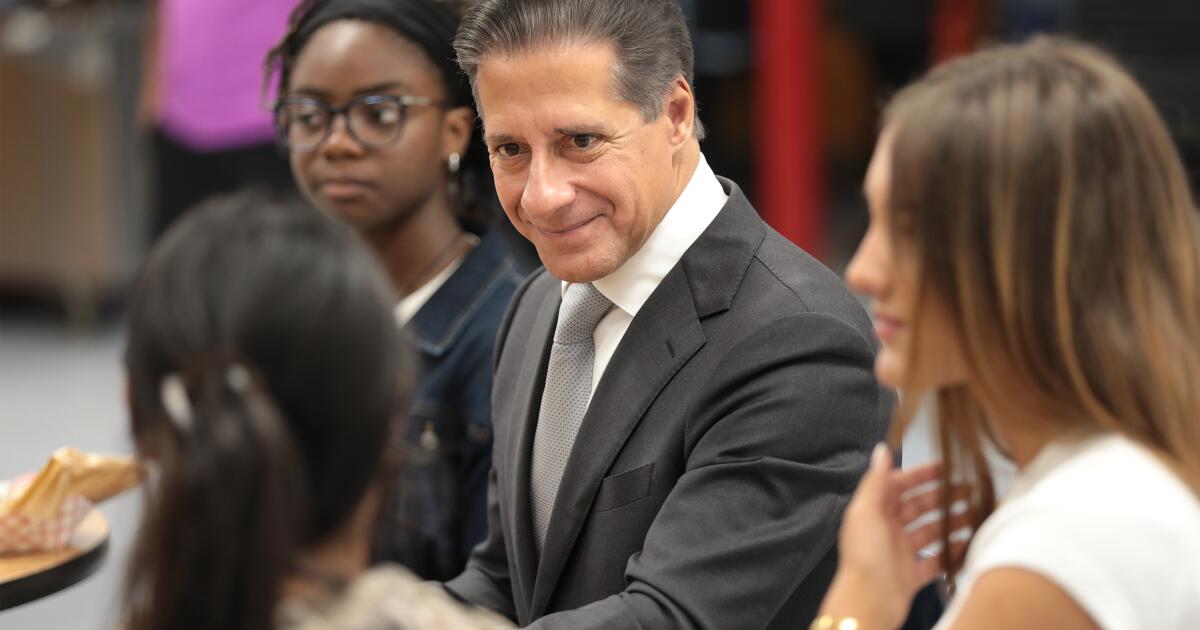The Los Angeles Board of Education agreed Wednesday in a 7-0 vote to retain L.A. schools Supt. Alberto Carvalho for another four years with the details of his contract still under negotiation.
In a brief announcement, Carvalho, 60, said he would not be seeking a raise for his role in leading the nation’s second-largest school system. His salary is $440,000 per year. The perks of the contract include an annual $50,000 retirement annuity over and above his salary.
“I want to be very clear with this board and this community that there’s nothing to negotiate,” Carvalho said in brief remarks after the announcement. “I’m not seeking, nor will I accept, a salary increase as part of my compensation or additional benefits. My contract is what my contract is, and the most important contract I have is with a beautiful community of Los Angeles, our staff, our students and our families.”
Carvalho has become especially visible in recent months as the leader of a school system that possibly has more recent immigrant families than any other in the nation. Los Angeles has become a center of immigration enforcement activity and also a locus of resistance to it — from Mayor Karen Bass to activists in the streets.
Carvalho — who was a teenage immigrant from Portugal — has said he would put his job at stake if necessary to protect and defend immigrant families, saying that standing by immigrant students and their families is “on the right side of history.”
On that issue, he is fully aligned with the elected Board of Education.
Other issues ahead include ongoing efforts to improve academic achievement, in which there has been recent progress on the basis of state standardized test scores.
“Superintendent Carvalho has shown steady leadership during challenging times at Los Angeles Unified,” school board President Scott Schmerelson said in a statement. “As challenges continue, we believe that his tenure can continue an upward trend in student performance and appreciate his openness to new ideas with the board’s insight and direction. I look forward to working closely with Mr. Carvalho and am happy to move forward with his leadership for another four years.”
Long-term financial challenges also loom, although the district currently has a reserve of about $5 billion — which has spurred labor unions to push for salary increases well above what the school system of about 400,000 students is offering.
“There is hardship in the future, and the best way to lead is to lead from the front with full awareness of the sacrifice that lies ahead and the contribution that each one of us can individually make,” Carvalho said Wednesday after the announcement. “This is my journey, and I want to thank the board for your trust, your confidence, and for your valor and courage in doing right by our community through the service that we collectively provide.”
In its announcement the school system highlighted state test scores that recently surpassed prepandemic levels for the first time and increasing Advanced Placement course participation rates, among other markers of progress.
In addition to the pressure from immigration raids, the district during his tenure had to respond to a major cyberattack and fires that swept across the region in January — displacing families, destroying two schools and badly damaging another.
Carvalho took over as L.A. school’s chief in February of 2022.
The extension of Carvalho’s tenure is likely to be well-received among numerous civic groups that have talked of the need for stability and have stressed the value of Carvalho’s experience and his skill at articulating the needs and progress of the school system. Before joining L.A. Unified, Carvalho was the long-time leader of the Miami-Dade school system.
The local nonprofit GPSN — which analyzes education issues independently and has been generally supportive of Carvalho — applauded the development.
“GPSN is encouraged by Mr. Carvalho’s decision to renew his commitment to Los Angeles students,” said Chief Executive Ana Ponce. “In a year marked by instability, continuity in leadership is essential to maintaining momentum. We are eager to see the positive academic gains continue and to build on the progress already underway for our students and communities.”
Also encouraged was Vanessa Aramayo, CEO and president of the local nonprofit Alliance for a Better Community.
“There is much to celebrate and still much to be done as LA Unified navigates the multiple crises complicating a smoother pathway to student success with equity at the center,” Amayo said.
Less enthusiastic was the leadership and a core group of frequent contributors to the Facebook group Parents Supporting Teachers. This group, which has thousands of members, also is independent, although frequently aligned with the L.A. teachers union.
“The members of Parents Supporting Teachers have serious concerns about Supt. Carvalho’s ability to lead our District,” said Nicolle Fefferman, a group leader. “Our Community Report Card indicates that in areas like budget management, student learning, and staff support, Mr. Carvalho has not done enough. We will continue to work with the [Board of Education] to address these concerns.
Employees unions are currently in frequently contentious contract negotiations with L.A. Unified.
Maria Nichols, head of Associated Administrators of Los Angeles, which represents principals and other mid-level managers, said she is prepared to work with Carvalho for the betterment of her members and for the well-being of students.
But she added that Carvalho needs to devote more effort to building strong relationships with employee groups that are doing the work of improving academic achievement.
“He’s on social media a lot, but he’s not a superintendent of the people,” Nichols said.
The United Teachers Los Angeles union has criticized Carvalho for not doing more for immigrant families, saying the district should intervene more aggressively to help them.
Under the terms of his original contract, he would have been automatically hired for the same four-year deal 90 days before the old contract expired, barring earlier action by the school board.
